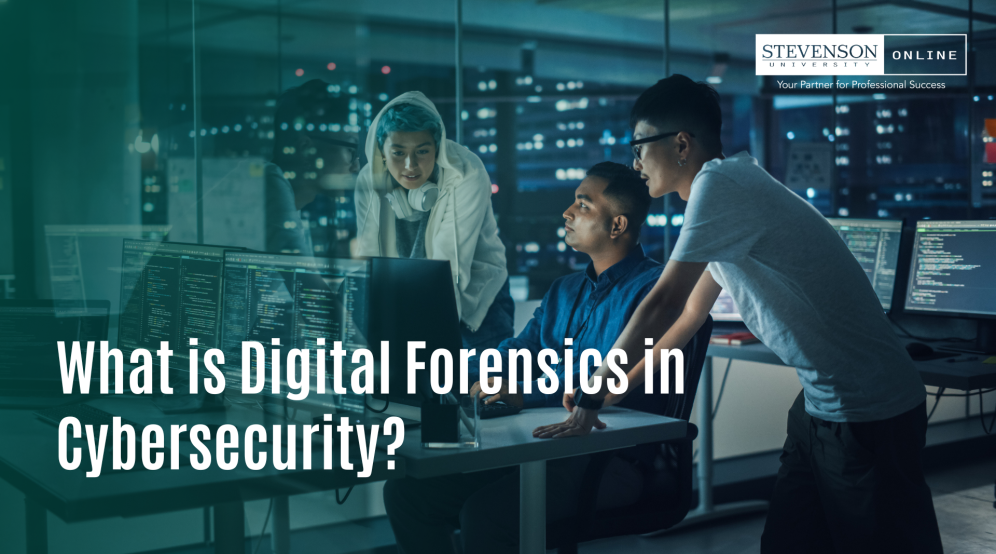If you’re interested in pursuing a career in cybersecurity, you’ve probably heard the term “digital forensics” thrown around. But what exactly is digital forensics, and why is it so important in the world of cybersecurity?
Defining digital forensics in cybersecurity
So, what is digital forensics in cybersecurity? Digital forensics in cybersecurity is a field that involves using scientific techniques and methods to identify, collect, analyze, and preserve digital evidence for the purpose of investigating and preventing cybercrime.
It is a critical component of cybersecurity that helps organizations and law enforcement agencies to identify and respond to security breaches, data theft, cyberattacks, and other digital crimes.
Why is digital forensics important?
Digital forensics is essential in the world of cybersecurity for several reasons. First, it can help organizations and law enforcement agencies investigate and prosecute cyber criminals. Digital evidence can provide valuable information about the origin of a cyber attack, the tools used by the attacker, and the data that was compromised.
Second, digital forensics can help organizations identify and remediate security incidents. By analyzing digital evidence, organizations can determine how an attack occurred and take steps to prevent it from happening again in the future.
How digital forensics helps to combat cybercrime
Digital forensics plays a critical role in the fight against cybercrime. By collecting and analyzing digital evidence, digital forensics professionals can help law enforcement agencies track down and prosecute cyber criminals.
Digital forensics can also help organizations identify and remediate security incidents, which can help prevent future attacks.
The essential skills for a cybersecurity digital forensics career
To succeed in digital forensics in cybersecurity, you need a combination of technical and analytical skills such as:
- Understanding operating systems and computer networks: Digital forensics professionals need to have a strong understanding of how operating systems and computer networks work.
- Familiarity with digital forensics tools and techniques: Digital forensics professionals need to be familiar with the tools and techniques used in digital forensics investigations, including evidence collection and analysis.
- Knowledge of computer programming and scripting languages: Digital forensics professionals need to have a solid foundation in computer programming and scripting languages such as Python and Bash.
- Strong analytical and problem-solving skills: Digital forensics professionals need to be able to analyze large amounts of data and identify patterns and anomalies.
- Attention to detail and the ability to work under pressure: Digital forensics investigations often involve complex and time-sensitive tasks, so digital forensics professionals need to be able to work under pressure while maintaining a high level of accuracy.
- Excellent communication and interpersonal skills: Digital forensics professionals often work with other members of their team or with law enforcement agencies, so strong communication and interpersonal skills are essential.
- Knowledge of cybersecurity laws and regulations: Digital forensics professionals need to be familiar with cybersecurity laws and regulations, including those related to evidence collection and preservation.
- Understanding the ethical and legal implications of digital forensics investigations: Digital forensics professionals need to be aware of the ethical and legal implications of their work, including issues related to privacy and data protection
How to get started in digital forensics
If you are interested in a career in digital forensics in cybersecurity, there are several paths you can take to get started:
- Pursue a bachelor’s degree in digital forensics or cybersecurity: An undergraduate degree in digital forensics or cybersecurity can provide you with the foundational knowledge and skills needed to succeed in this field.
- Gain experience in IT or law enforcement: Many digital forensics professionals begin their careers in IT or law enforcement, where they can develop the technical and investigative skills needed for digital forensics. Consider gaining experience in IT or law enforcement before transitioning to digital forensics.
- Attend industry conferences and training sessions: Attending industry conferences and training sessions can help you stay up-to-date on the latest trends and best practices in digital forensics.
- Network with professionals in the field: Networking with professionals in the digital forensics and cybersecurity fields can help you learn more about the industry, gain valuable insights, and make connections that can lead to job opportunities.
How to advance your career in digital forensics
Once you’ve gained experience in digital forensics, there are several ways to advance your career:
- Earn industry certifications: Earning industry certifications, such as the Certified Computer Examiner (CCE) or the Certified Forensic Computer Examiner (CFCE), can help you demonstrate your expertise and stand out to employers.
- Specialize in a specific area of digital forensics: Specializing in a specific area of digital forensics, such as mobile device forensics or network forensics, can help you become an expert in your field and open up new career opportunities.
- Seek out leadership roles: As you gain experience in digital forensics, consider seeking out leadership roles within your organization or industry. This can include roles such as team lead, manager, or director.
However, overall, a master’s degree in cybersecurity and digital forensics can be the ultimate career accelerator.
By enrolling in a master’s program, you’ll acquire specialized knowledge and skills that can set you apart in the job market, help you advance to leadership positions, and boost your earning potential.
Beyond the academic benefits, pursuing a master’s degree also offers unparalleled opportunities for networking, specialized training, and access to a wider range of job opportunities in the cybersecurity and digital forensics industries.
In addition, many master’s programs offer internships and other practical experiences that allow you to apply what you’ve learned in real-world settings. This type of hands-on experience can be invaluable when seeking employment, as it demonstrates your ability to apply theory to practice and work collaboratively with others.
Be at the forefront of combating cybercrime
Digital forensics is a critical component of combating cybercrime, and professionals in this field are at the forefront of the fight against cybercriminals. By pursuing a career in digital forensics and staying up-to-date on the latest trends and best practices, you can help protect individuals and organizations from cyber threats and make a meaningful impact in the field. And by earning a master’s degree in digital forensics or cybersecurity, you can take your career to the next level and position yourself for success in this exciting and rapidly evolving industry.
������ýֱ�� Online offers a fully online Master’s in Cybersecurity and Digital Forensics that can help you accelerate your cybersecurity career path. Our program is designed to provide you with the knowledge and skills you need to succeed in a variety of digital forensics and cybersecurity careers.
Contact our Enrollment Counselors today to learn more about our Master’s in Cybersecurity and Digital Forensics program.







